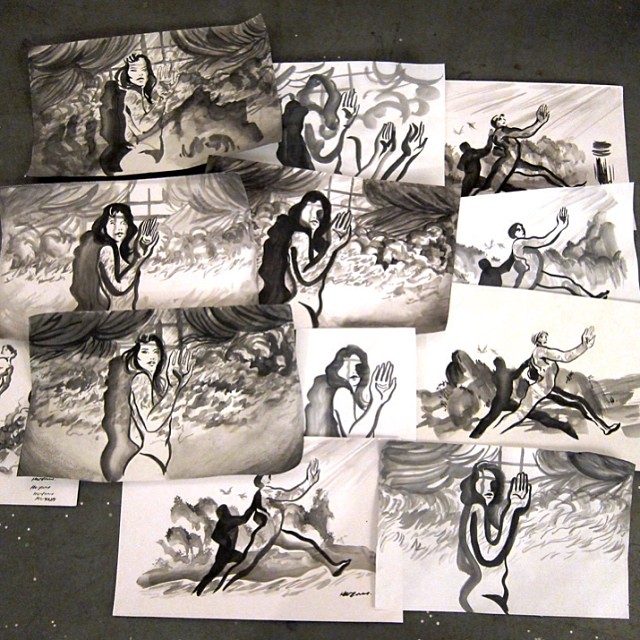-
February 13, 2014
excerpt: teapot piñata
As family lore later recalls, you arrive from the womb with not even a peep. The midwife gives you a vigorous shake, as if the customary, inaugural wail she is looking for just happens to be stuck in there, rolling around in some hidden cavity like a loose marble. She shakes you again. Nothing. ‘SOMETHING […]
-
February 12, 2014
excerpt: the fantastic breasts
So I see this pair of Fantastic Breasts one day. I’m at a conference, in the foyer, pinning on my name tag. A hundred plain-looking, spotty breasts are milling about, sipping chamomile tea from styrofoam cups. They’re all wearing farsighted spectacles that magnify their nipples. The topic of the next session is The Difficulties of […]
-
February 10, 2014
the man without qualities
“Encompassing the complexity of existence in the modern world demands a technique of ellipsis, of condensation. Otherwise you fall into the trap of endless length. The Man Without Qualities is one of the two or three novels I love most, but don’t ask me to admire its enormous unfinished size. Imagine a castle so big that it can’t all be seen at once. Imagine a string quartet that goes on for nine hours. There are anthropological limits—the limits of memory, for instance—that ought not to be exceeded. When you reach the end of a book you should still find it possible to remember the beginning.”
— Milan Kundera, The Art of the Novel, Faber and Faber, London, 2005, pp.71-72.
-
February 1, 2014
friendsville
It’s tough being stuck in Friendsville. You once took a wrong turn with a girl and ended up in this town. A rabid networker, she took to playing social tennis in a dress that covered her only as far as her liver, or perhaps, when stretched, her small intestine. “It’s very short,” you remarked as […]
-
HELENA J. GINSBURG (1980-2007)
Late of Potts Point. Killed tragically last week at the age of 26 in a hit-and-run incident. Lived an attention-seeking and extravagant life, almost certainly an adverse reaction to troubled early years characterised by abandonment and poverty. Abhorred authority and was an extremely vocal supporter of anti-establishment causes. A consummate lap dancer but only performed […]
-
January 30, 2014
two faces
“Now a narrative is a story, not logic, nor ethics, nor philosophy. It is a dream you keep having, whether you realize it or not. Just as surely as you breathe, you go on ceaselessly dreaming your story. And in these stories you wear two faces. You are simultaneously subject and object. You are the whole and you are a part. You are real and you are shadow. “Storyteller” and at the same time “character”. It is through such multilayering of roles in our stories that we heal the loneliness of being an isolated individual in the world.”
— Haruki Murakami, Underground, Vintage, London, 2003, p.201.
-
January 29, 2014
the secret compartment
“You become a different person, you are no longer an ordinary fellow who walks around and looks after his children and eats meals and does silly things, you go into a completely different world. I personally draw all the curtains in the room, so that I don’t see out the window and put on a little light which shines on my board. Everything else in your life disappears and you look at your bit of paper and get completely lost in what you’re doing. You do become another person for a moment. Time disappears completely. You may start at nine in the morning and the next time you look at your watch, when you’re getting hungry, it can be lunchtime. And you’ve absolutely no idea that three or four hours have gone by. So when you meet a musician or a writer, you shouldn’t be surprised that they look exactly like ordinary people, because in that part of their lives they are … All the best artists that I’ve known, like Hemingway and Steinbeck and EB White and Thurber, behave very normally in their private lives … They are ordinary people who have a secret compartment somewhere in their brain which they can switch on when they become quite alone and go to work.”
— Roald Dahl, quoted in Donald Sturrock, Storyteller: The Life of Roald Dahl, HarperPress, London, 2010, p.521.
-
January 28, 2014
orlando
“The taste for books was an early one. As a child he was sometimes found at midnight by a page still reading. They took his taper away, and he bred glow-worms to serve his purpose. They took the glow-worms away, and he almost burnt the house down with a tinder. To put it in a nutshell, leaving the novelist to smooth out the crumpled silk and all its implications, he was a nobleman afflicted with a love of literature. Many people of his time, still more of his rank, escaped the infection and were thus free to run or ride or make love at their own sweet will. But some were early infected by a germ said to be bred of the pollen of the asphodel and to be blown out of Greece and Italy, which was of so deadly a nature that it would shake the hand as it was raised to strike, and cloud the eye as it sought its prey, and make the tongue stammer as it declared its love. It was the fatal nature of this disease to substitute a phantom for reality, so that Orlando, to whom fortune had given every gift — plate, linen, houses, men-servants, carpets, beds in profusion — had only to open a book for the whole vast accumulation to turn to mist. The nine acres of stone which were his house vanished; one hundred and fifty indoor servants disappeared; his eighty riding horses became invisible; it would take too long to count the carpets, sofas, trappings, china, plate, cruets, chafing dishes and other movables often of beaten gold, which evaporated like so much sea mist under the miasma. So it was, and Orlando would sit by himself, reading, a naked man.”
— Orlando, Virginia Woolf.
January 31, 2014
be good (lion’s song)
Gregory Porter’s Be Good (Lion’s Song). Directed by Pierre Bennu.



 View gallery »
View gallery »